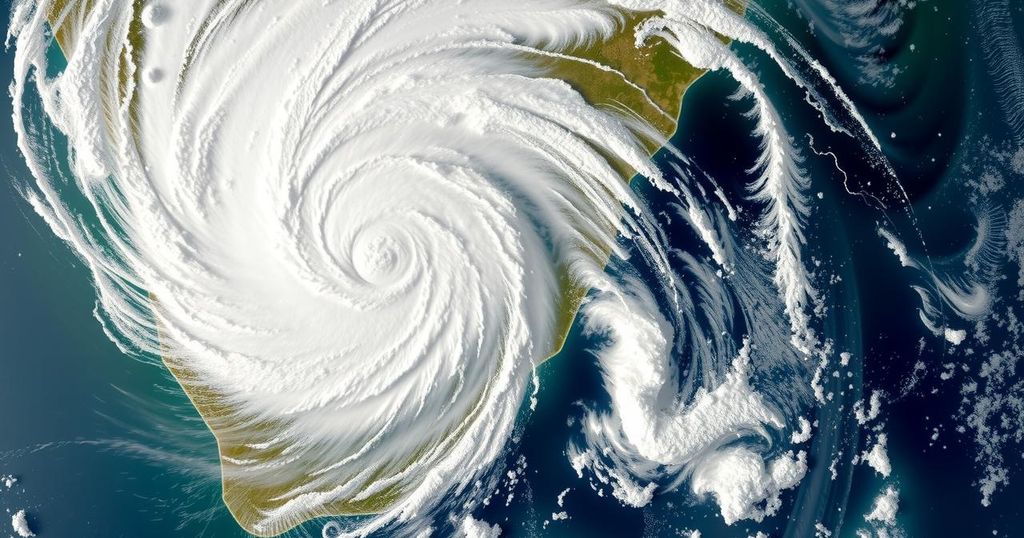World news
AFRICA, CHI, EAGLETON, EMERGENCY RESPONSE, ERATI, FLOODING, HUMANITARIAN AND EMERGENCY OPERATIONS CENTRE, ILHA DE IBO, LOUISE EAGLETON, MARY -, MARY - LOUISE EAGLETON, MONAPO, MONGICUAL, MOZAMBIQUE, NATURAL DISASTER, NATURAL DISASTERS, PEMBA, SADC, SHOC, SOUTHERN AFRICAN DEVELOPMENT COMMUNITY, UNICEF
Fatima Alavi
0 Comments
Cyclone Chido’s Impact in Mozambique: Destruction and Humanitarian Efforts
Cyclone Chido made landfall in Mozambique on December 15, with destructive winds and heavy rainfall, primarily affecting Cabo Delgado and Nampula provinces. UNICEF mobilized to address urgent needs, while ongoing assessments indicate significant damage and disruption in communicated services. The cyclone’s remnants are expected to impact southern Malawi, with broader implications for surrounding regions.
Tropical Cyclone Chido made landfall in Mozambique on December 15, around 6 AM, registering as a category 4 storm with destructive wind speeds of up to 260 km/h and heavy rainfall measuring 250mm in merely 24 hours. Primarily striking the provinces of Cabo Delgado and Nampula, the cyclone wreaked havoc in several areas, including Pemba city and surrounding regions. Damage assessments are ongoing, with reports of disrupted communications and potential housing damage.
The Southern African Development Community’s (SADC) Humanitarian and Emergency Operations Centre issued warnings regarding the severe effects of Chido, which included the uprooting of trees and destruction of essential infrastructure. Other provinces, including Niassa, Tete, and Zambezia, were poised for similar impacts. Communities were urged to remain vigilant and to follow updates from their national weather services.
UNICEF has initiated assessments in Cabo Delgado to gauge the cyclone’s impact on vulnerable populations, particularly children and families, following the destruction of homes and health facilities. Mary-Louise Eagleton, the UNICEF Mozambique Representative, stated, “UNICEF will be delivering lifesaving medicines, water purification supplies, and other essentials to keep people safe and healthy.” It was emphasized that further support is critical to meet the urgent needs of those affected.
As Cyclone Chido continues to dissipate, its remnants are projected to impact southern Malawi, bringing additional rainfall and winds. Previously, on December 14, Chido passed near the Comoros islands, causing minimal damage. Anjouan island reported injuries and displacements, while Moheli experienced crop losses. Consequently, communities remain in recovery as they adapt to the ongoing challenges posed by the cyclone.
Tropical cycles frequently impact the southern regions of Africa, and Cyclone Chido is one of the more recent examples of such weather phenomena. With the potential to cause unprecedented damage due to strong winds and heavy rainfall, the aftermath of these cyclones necessitates immediate humanitarian response efforts. This article discusses the impact of Cyclone Chido, particularly in Mozambique’s Cabo Delgado and Nampula provinces, while also shedding light on the broader implications for neighboring regions, such as Malawi and the Comoros islands.
Cyclone Chido’s landfall has prompted severe weather conditions across northern Mozambique, particularly affecting Cabo Delgado and Nampula. With reports of destruction and continued weather warnings in neighboring provinces, immediate humanitarian responses are crucial. UNICEF’s involvement showcases the need for concerted efforts in restoring essential services and providing relief to the affected populations. As the cyclone moves away, the focus now shifts towards recovery and support for those impacted.
Original Source: allafrica.com




Post Comment